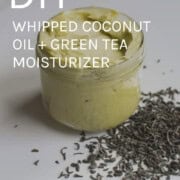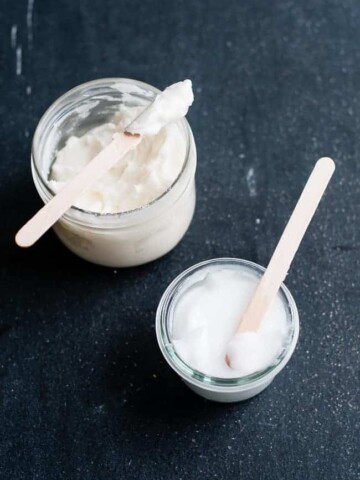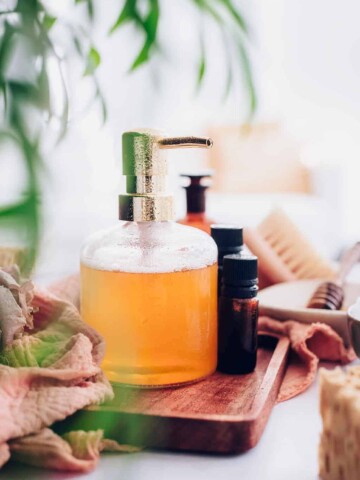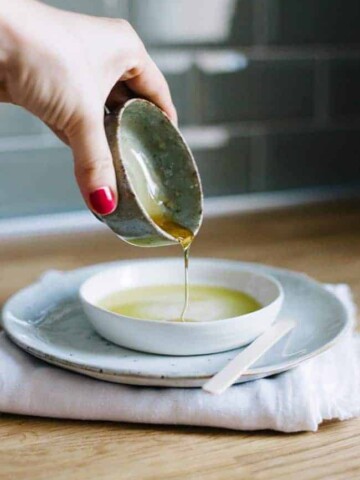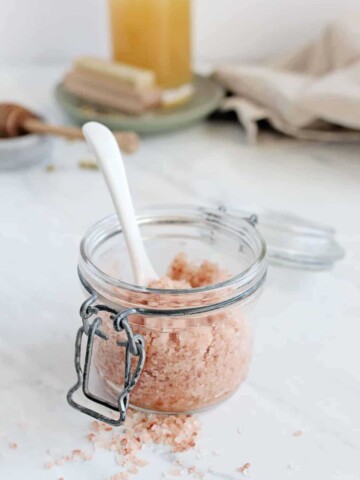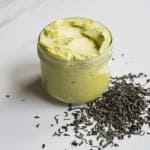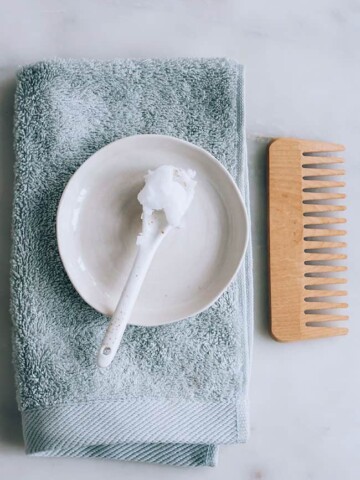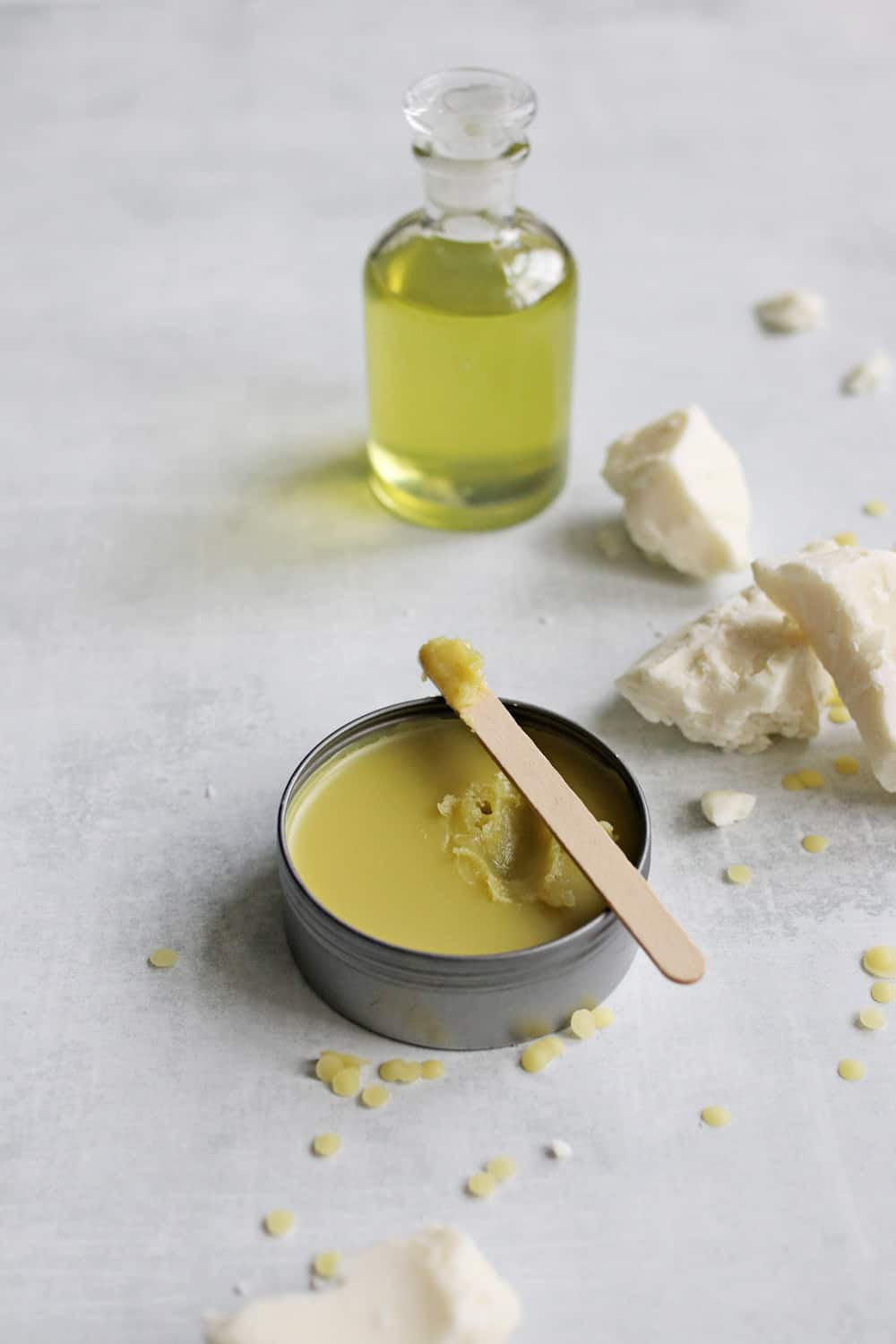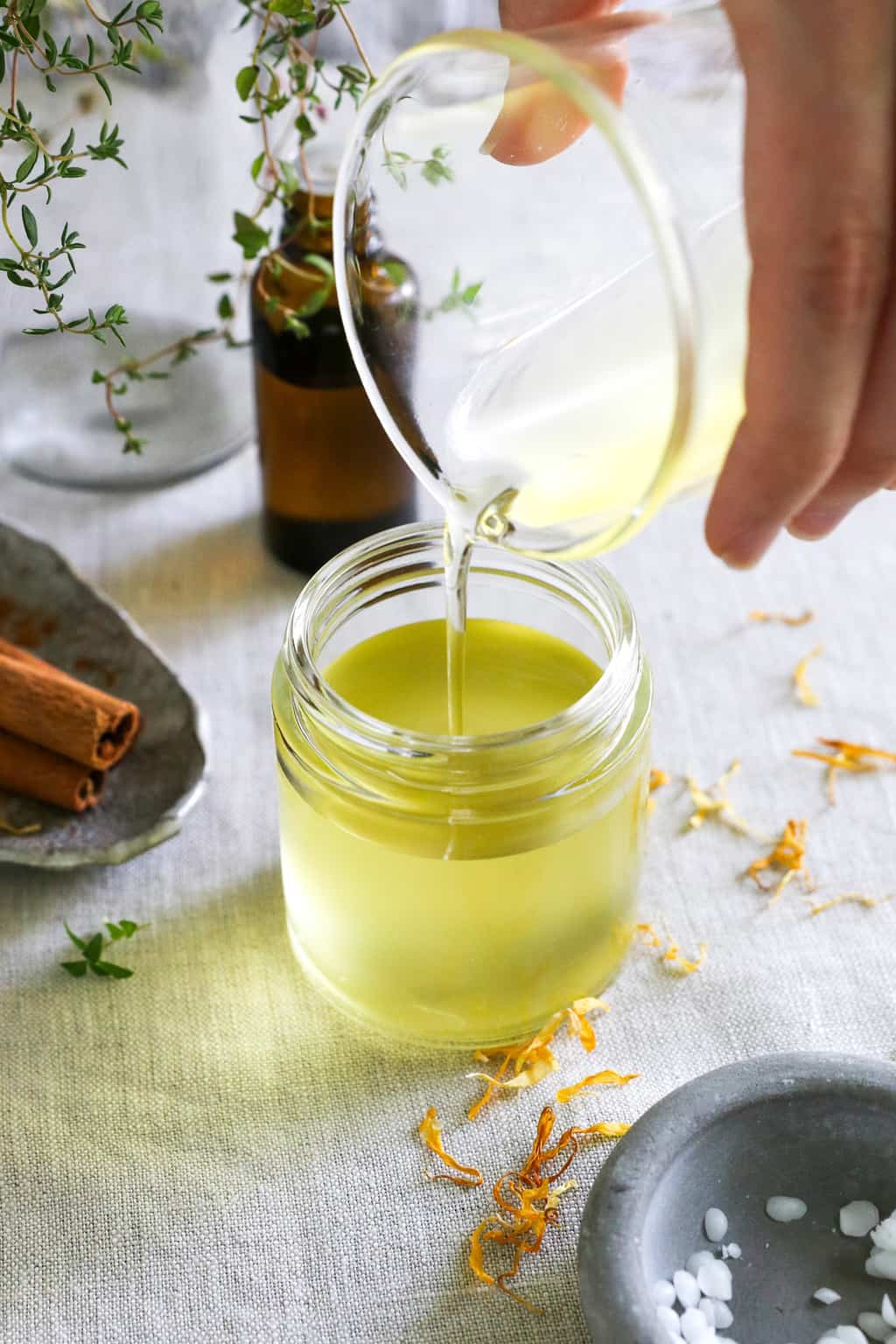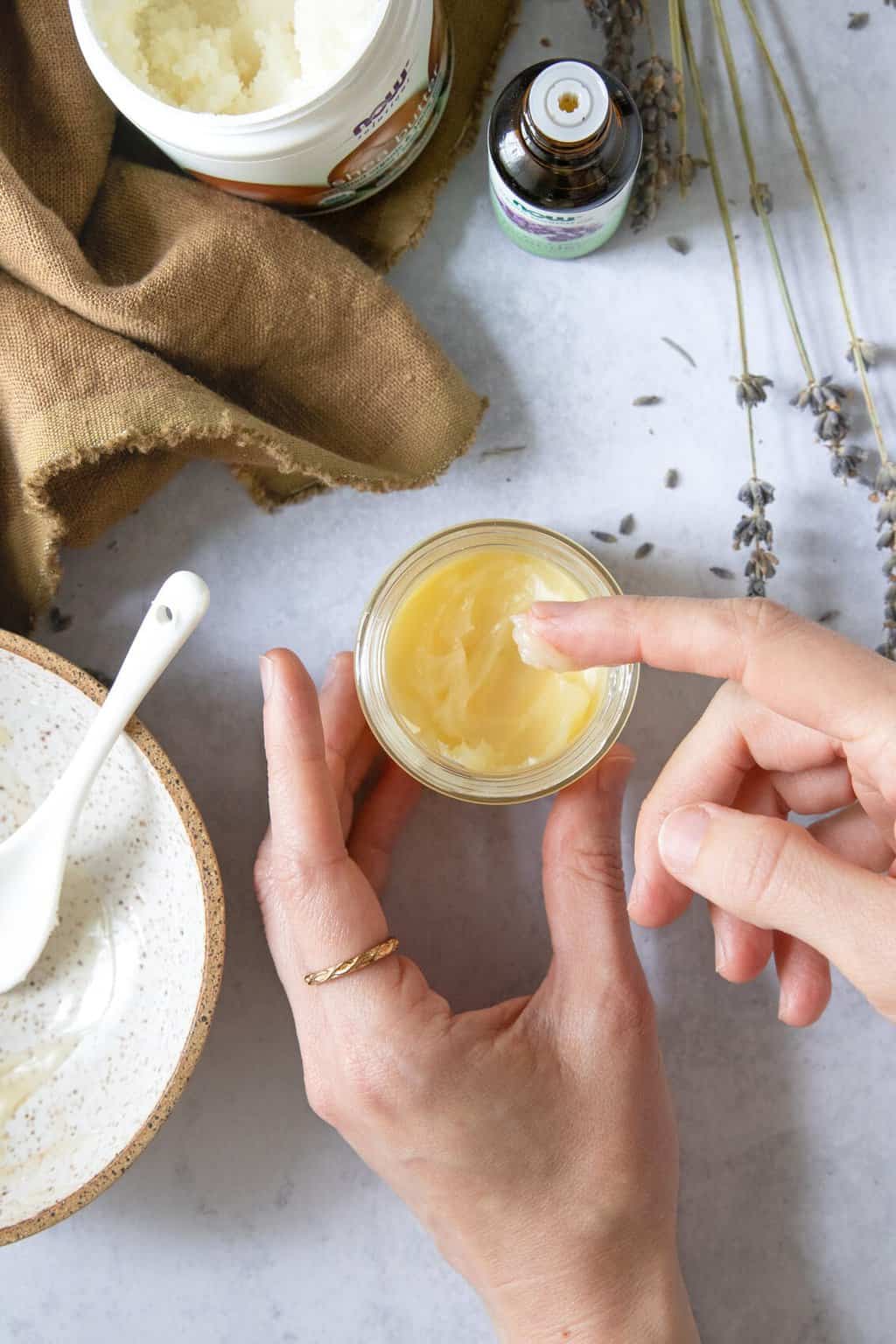There’s a good reason that green tea is included in tons of skincare products on the shelves of beauty stores worldwide. Yes, green tea has some impressive beauty benefits. It can work magic on its largest organ: our skin. Which brings us to my new favorite recipe: green tea and coconut oil moisturizer. Its whipped texture feels amazing on your skin, so you'll want to use it all the time. Read on for the recipe!
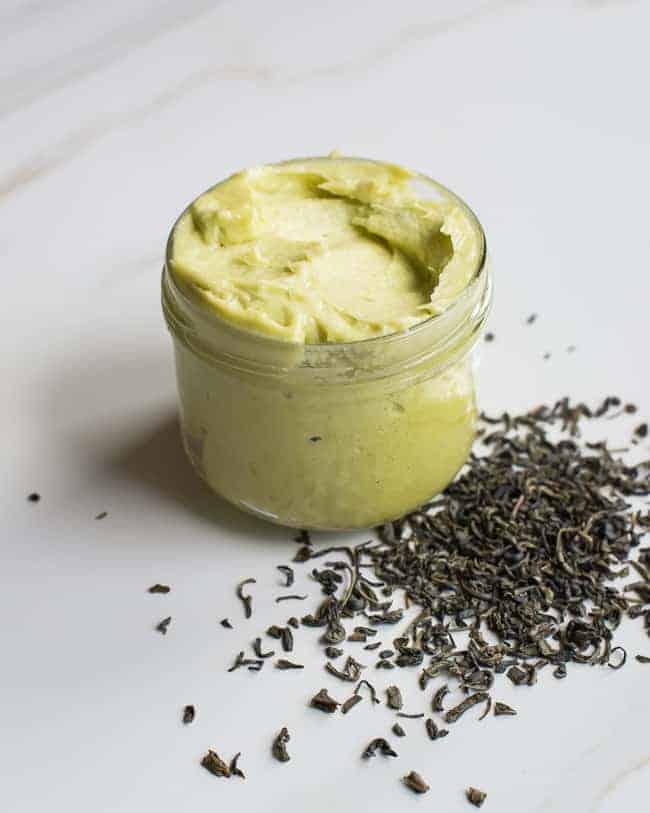
A coconut oil moisturizer hydrates and nourishes skin, while green tea helps to reverse sun damage. So the two working together are pretty amazing for your skin. Whipping it makes a nice frothy texture that's easier to apply and feels less greasy (if that bothers you).
And did I mention that it's green? No, it won't turn your skin green, but it does make me smile every time I see it.
Jump to:
Reasons To Add Green Tea To Your Moisturizer
Green tea has been used since ancient times as a cure-all for just about any ailment. Discovered in China some 5,000+ years ago, it is still considered today to be one of the healthiest beverages on the planet, thanks to its high antioxidant content [source].
In short, if you aren’t drinking green tea, you are missing out on an easy way to improve your skin and health! Plus, here are a few of the ways that green tea can benefit your skin:
Green tea is anti-aging
The antioxidants in green tea work to repair skin and eliminate wrinkles, mainly by fighting off free radicals in the environment that directly cause premature aging [source]. This is due in part to the fact that green tea is rich in polyphenols, a type of antioxidant that slows the aging process in a natural way [source].
Putting green tea on your skin has also been proven to protect against sun damage [source], so that’s another anti-aging bonus.
Green tea helps fight acne
Yep, slathering green tea on your face provides skin-clearing benefits—thanks to the fact that green tea can help reduce oil production [source], thus leading to fewer breakouts.
Green tea helps protect against cancer
As already mentioned, green tea has some impressive anti-cancer effects. In terms of the skin, it’s been shown in research to reduce the tumor size in certain types of skin cancer [source].
Green tea calms skin conditions
Green tea has long been used to treat various skin conditions, such as psoriasis, eczema, and rosacea. This is mainly due to its anti-inflammatory effects [source].
So now that we’ve covered the grounds of why pretty much everyone should be using green tea in and out of their skincare regimen, let’s talk about why we should be combining it with other natural ingredients like coconut oil if our goal is to create a facial moisturizer.
Ingredients
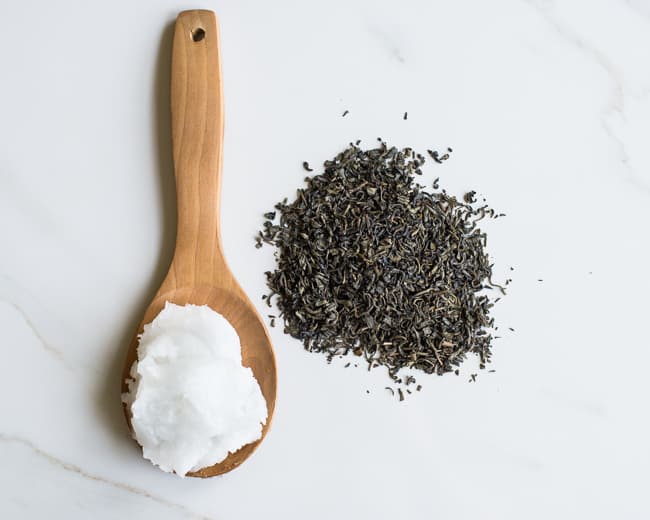
Will coconut oil make me break out?
Now, before we get into infusing our oils, I want to talk about coconut oil and acne. Coconut oil is pretty high on the list of comedogenic oils, meaning it can clog pores and cause irritation if you're not careful.
But from personal experience, I've found that not everyone has the same reaction to coconut oil so your experience may vary. And, you might want to try out a couple of brands to see if it changes how your skin feels about coconut oil.
High quality, clean brands don't contain as many irritants as cheaper brands do, which is why I like Dr. Bronner's coconut oil (not sponsored—I just love 'em.) It's the only one I use on my face because it doesn't break me out like most other brands of coconut oil.
If you decide to try another brand, just keep an eye out for irritation, and stop using it the second you spot a breakout coming on.
Instructions
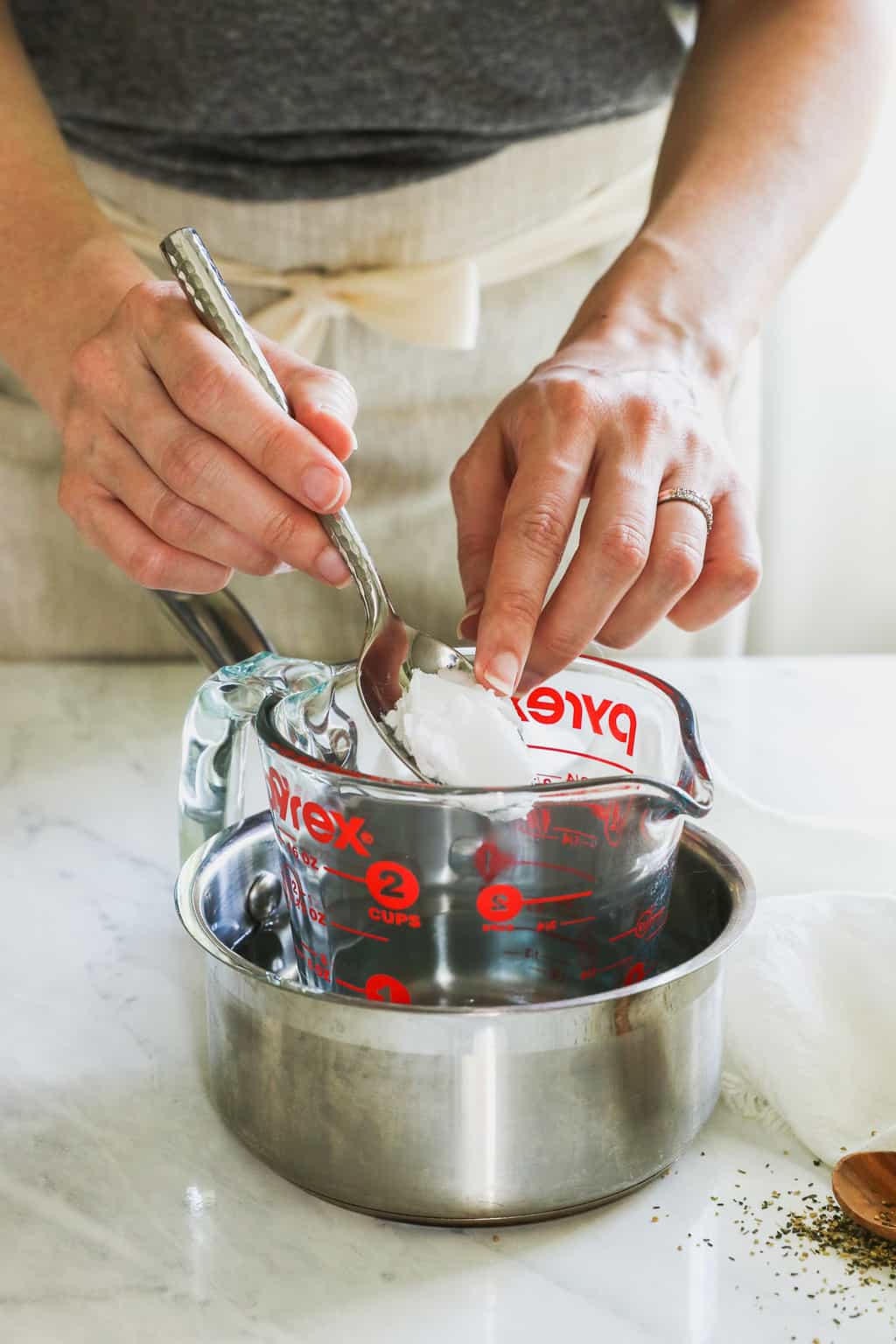
Step 1: Melt coconut oil
Spoon coconut oil into a double boiler and heat on low until melted.
If you don't have a double boiler, just do what I do: set a glass Pyrex measuring cup or other heat-proof container in the middle of a small saucepan. Pour water into the saucepan, so it reaches about 2 inches up the outside of the measuring cup.
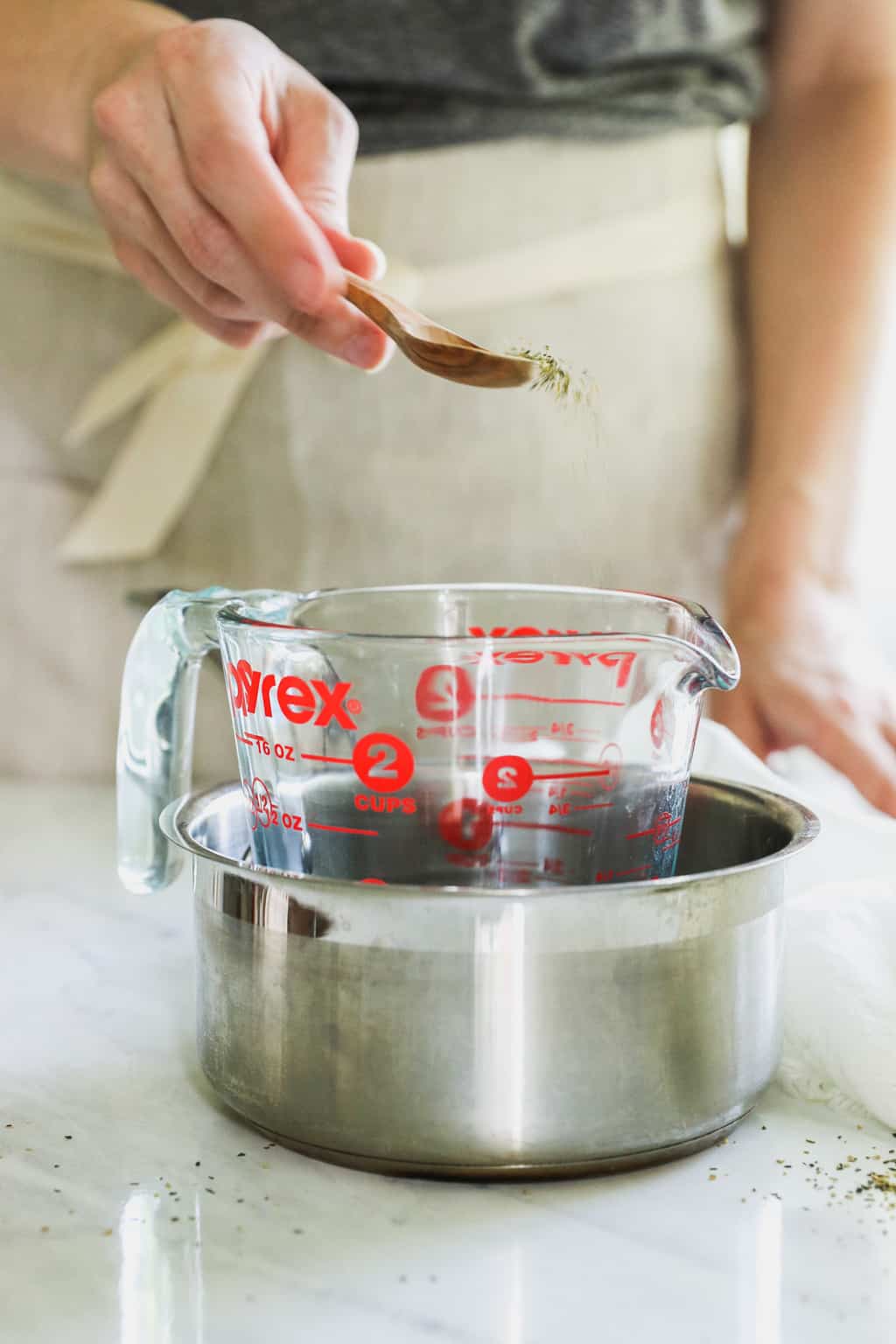
Step 2: Infuse green tea
Stir in the green tea, cover, and simmer on the lowest heat setting for 30 minutes.
If you don't have loose-leaf green tea, you can use tea bags. But if you notice your infusion looks weak, cut open the tea bag and put it directly into the coconut oil.
The water should be simmering, not the coconut oil itself.
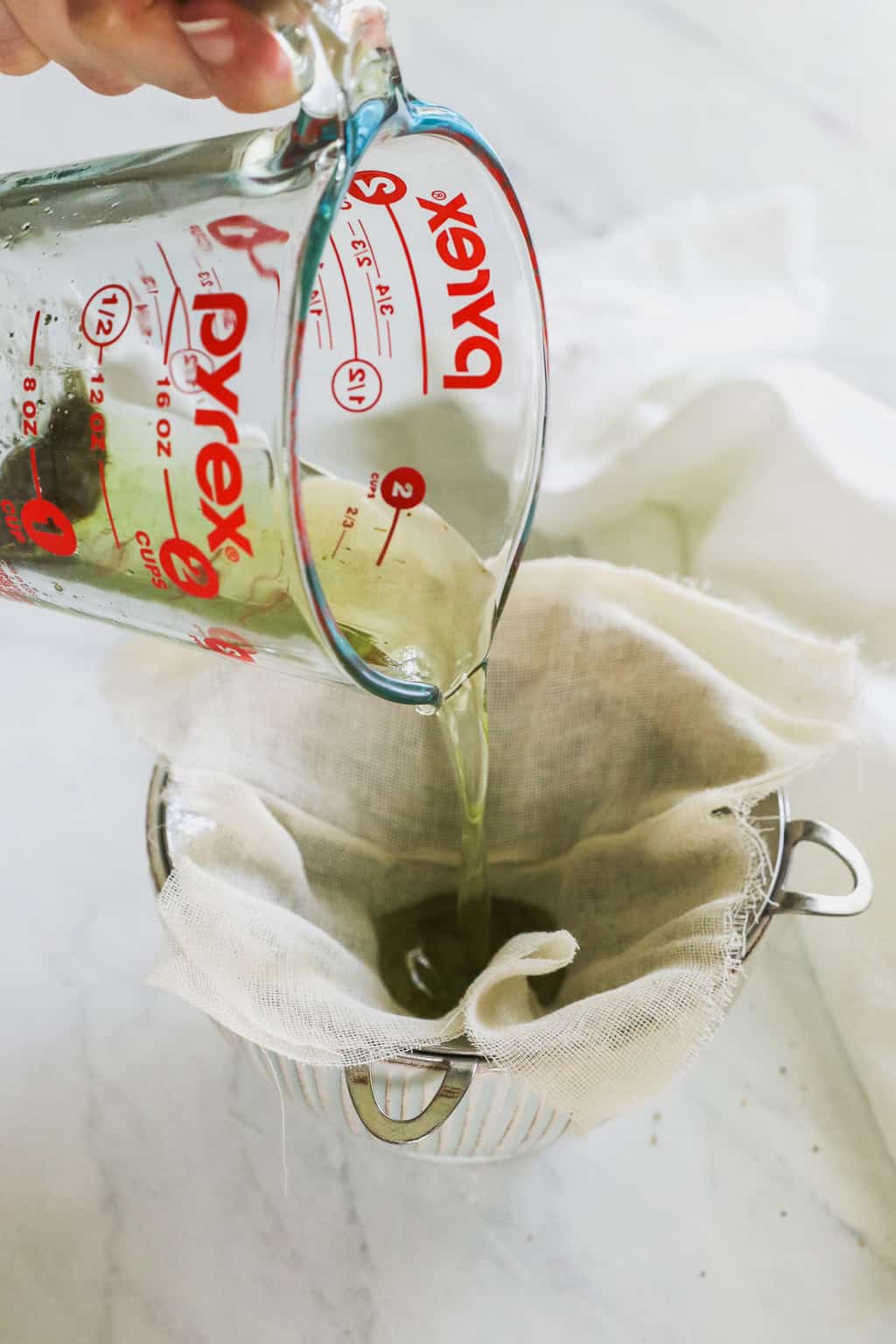
Step 3: Strain out the tea
Let the oil cool slightly, but not enough that the coconut oil hardens. Then strain the tea from the oil with cheesecloth.
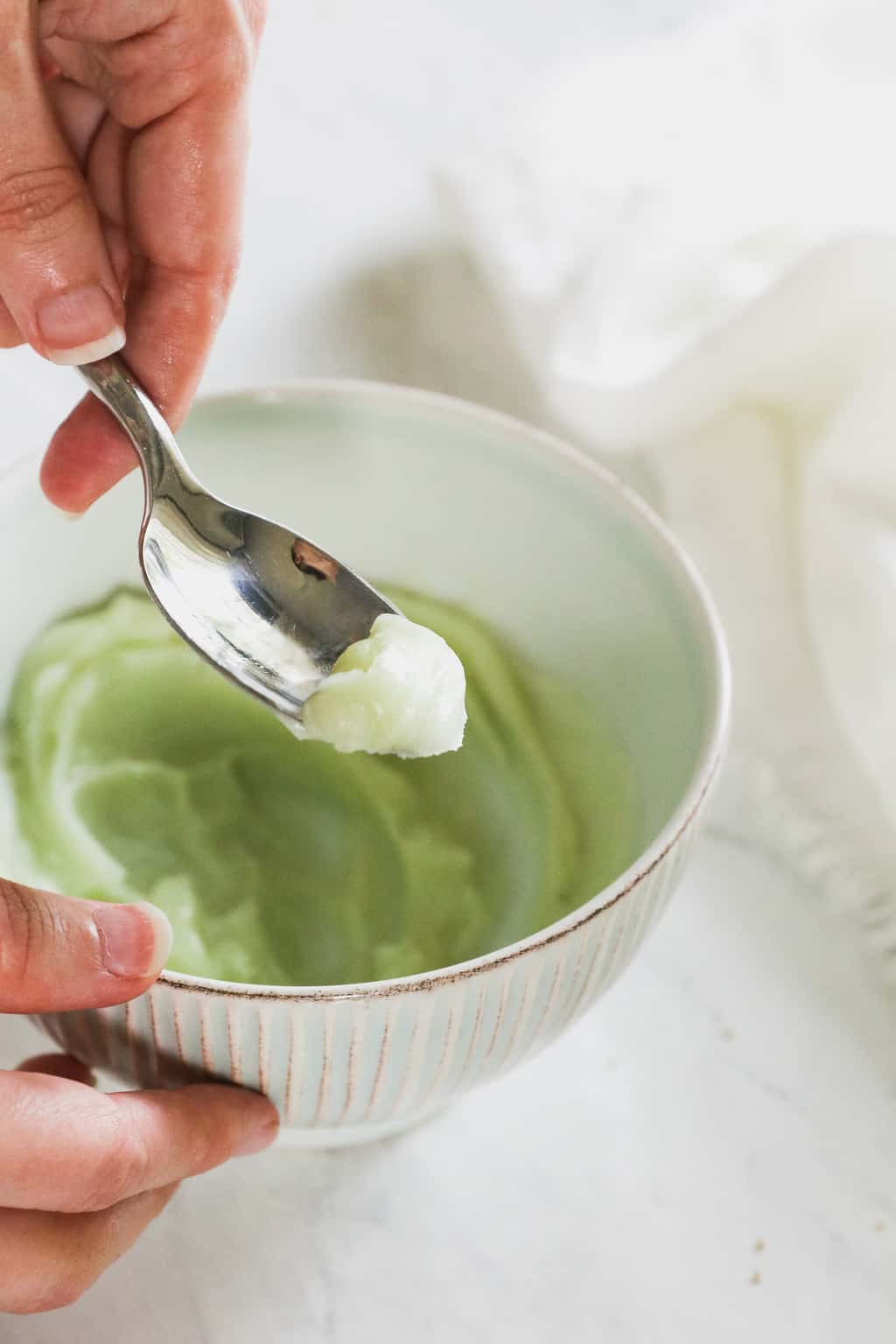
Step 4: Cool the oil
Place the oil in the freezer for 10–20 minutes until the mixture is almost solid (like a loose gel consistency when you stir it).
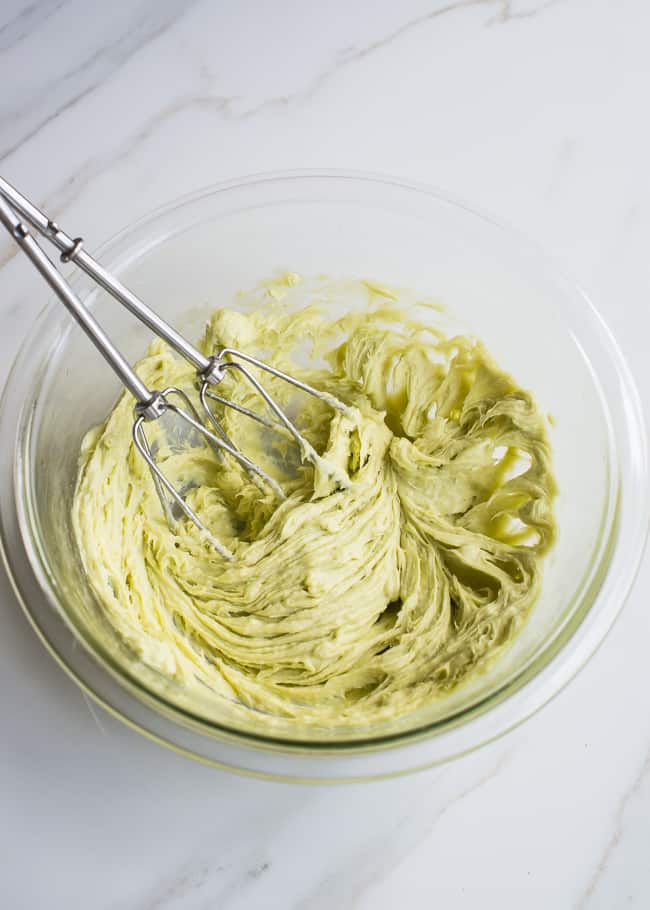
Step 5: Whip the oil
To get the whipped butter consistency, use an electric mixer for 3–5 minutes until the texture turns creamy.
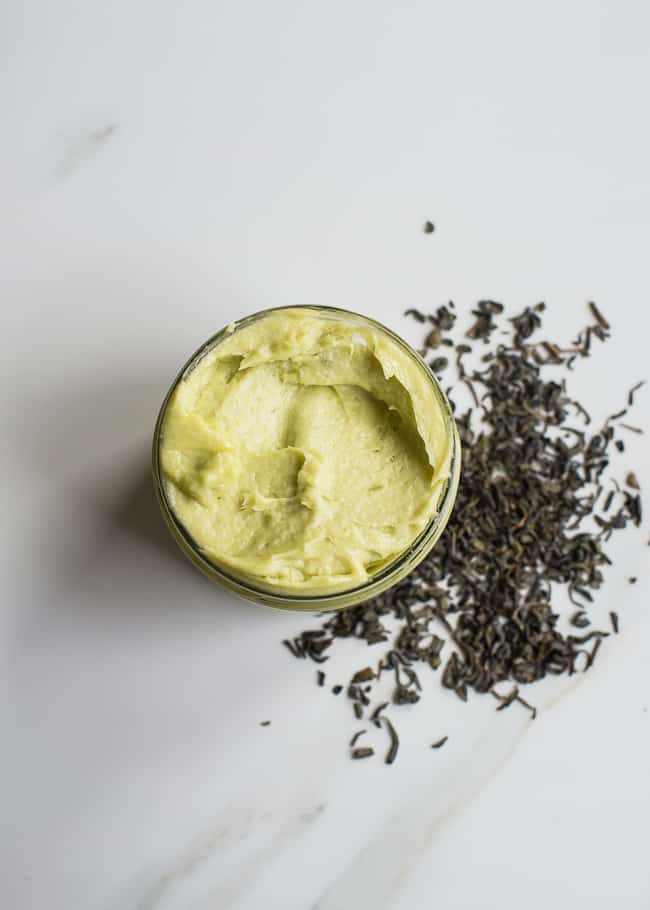
Step 6: Store the mixture
Transfer the whipped coconut oil to a glass jar with a lid. Apply to your face after cleansing 1-2 times a day.
Storage
If you live in a hot climate, you can store the moisturizer in the refrigerator to keep the coconut oil from melting. As long as you strain the tea out well, the infused coconut oil should last 3–6 months.
How To Use Coconut Oil Moisturizer
Use this just like you would any other moisturizer. Cleanse your face then apply toner, serum, and eye cream (in that order).
Take a tiny bit of the coconut oil moisturizer onto your fingers and let it melt a bit before gently applying it to your skin.
Let it sink in for several minutes before putting on makeup or sunscreen. Use twice a day, every day, to reap all of those green tea benefits.
Head to toe: This nourishing lotion does anything regular ol' coconut oil does. You can use coconut oil in your beauty routine as a body lotion, hand cream, after-shave balm, and smoothing hair serum. This moisturizer has got you covered—it can do it all.
Extra green tea-infused oil? Try making this SPF lip balm for a bit of extra sun protection to keep lips soft and smooth!
FAQ
Yes, you don't need to use green tea at all for this if you don't want to. Rooibos tea can help reinvigorate the skin, while Yerba Mate, which is caffeinated, can help tone skin.
You can also infuse herbs such as chamomile, lavender, and rosemary, if you prefer. Read more on making herbal oils here.
Sure! In fact, we did a whole post on matcha lotion bars. While the ingredients are different, the idea is the same: just add 1–2 teaspoons of powdered matcha, let it steep, and then whip up your moisturizer without straining out the tea. Use within 2–3 months.
Sure, you can infuse almost any oil, but to get the whipped texture you'll need to combine it with a butter that's solid at room temperature (e.g., shea, cocoa, or mango butter).
It depends on the climate. Since coconut oil starts to melt once the temperature reaches 78 F, so depending on where you live, you may need to keep your moisturizer in the refrigerator for a couple of months of the year.
More Coconut Oil Recipes
Want to add more coconut oil to your beauty routine? We've got you covered:
Whipped Coconut + Green Tea Moisturizer
Equipment
- Double boiler (or a heat-proof jar and small saucepan)
- Cheesecloth
- Electric mixer
Materials
- 1 cup coconut oil *
- 2 tablespoons loose green tea or cut open tea bags
Instructions
- Spoon coconut oil into a double boiler and heat on medium until melted.(If you don't have a double boiler, just do what I do: set a glass Pyrex measuring cup or other heat-proof container in the middle of a small saucepan. Pour water into the saucepan, so it reaches about 2 inches up the outside of the measuring cup. Then place your coconut oil in the measuring cup, and turn on the burner.)
- Stir in the green tea, cover, and simmer on lowest heat setting for 30 minutes. Note: the water around the coconut oil should be simmering, not the coconut oil itself. This will help keep the beneficial nutrients in the tea from breaking down.
- Strain tea from the oil with a cheesecloth.
- Place in the freezer for 10–20 minutes until the mixture is almost solid (like a loose gel consistency)
- Then whip 3–5 minutes until creamy.
Notes
This post was medically reviewed by Dr. Jennifer Haley, a board-certified dermatologist with extensive experience in medical, cosmetic, and surgical dermatology. Learn more about Hello Glow’s medical reviewers here. As always, this is not personal medical advice, and we recommend that you talk with your doctor.
913
